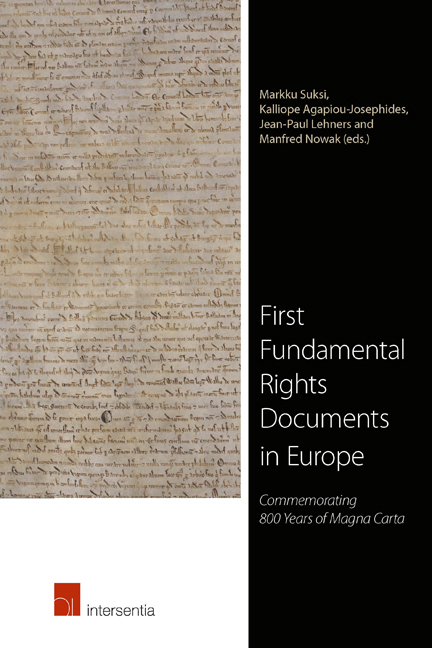Book contents
- Frontmatter
- Preface
- Contents
- List of Authors
- 1 Introduction
- PART I
- 2 The United Kingdom: From Magna Carta 1215 to the Rule of Law
- 3 Ireland: Individual and Group Rights in Ancient Irish Law
- 4 Italy: The Liber Paradisus — A Vision of Good Governance
- 5 Hungary: The Historic Constitution as the Place of Memory
- 6 Belgium: From Collective Privileges to Individual Rights
- 7 Austria: Manorial Regulation of Mining and Use of Forests as Potential Antecedents in Fundamental Rights
- 8 Spain: The First Cry for Justice in the Americas — From Antonio de Montesinos to the Laws of Burgos (1512)
- 9 Lithuania: From Equality to Inequality and to Equality Again
- 10 Poland: From the Golden Liberty of the Nobles to Fundamental Rights
- PART II
- Index
5 - Hungary: The Historic Constitution as the Place of Memory
from PART I
Published online by Cambridge University Press: 15 December 2017
- Frontmatter
- Preface
- Contents
- List of Authors
- 1 Introduction
- PART I
- 2 The United Kingdom: From Magna Carta 1215 to the Rule of Law
- 3 Ireland: Individual and Group Rights in Ancient Irish Law
- 4 Italy: The Liber Paradisus — A Vision of Good Governance
- 5 Hungary: The Historic Constitution as the Place of Memory
- 6 Belgium: From Collective Privileges to Individual Rights
- 7 Austria: Manorial Regulation of Mining and Use of Forests as Potential Antecedents in Fundamental Rights
- 8 Spain: The First Cry for Justice in the Americas — From Antonio de Montesinos to the Laws of Burgos (1512)
- 9 Lithuania: From Equality to Inequality and to Equality Again
- 10 Poland: From the Golden Liberty of the Nobles to Fundamental Rights
- PART II
- Index
Summary
‘Very deep is the well of the past. Should we not call it bottomless?’
(Thomas Mann: Joseph and his brothers)INTRODUCTION
Like Magna Carta in England, the Golden Bull in Hungary can be regarded as, if not necessarily the first, certainly a milestone document in the history of human rights. Parallels have often been drawn between the two documents: they have both been regarded as the result of efforts of the privileged to check the powers of kings in the feudal times of the thirteenth century, though it has also been pointed out that the differences between English and Hungarian social conditions make the comparison problematic.
Rather than examining the text of the Golden Bull itself, which would be a heroic undertaking as there is no original sample, only later copies, we will look at how the document is read and interpreted. Readings of history are not only and perhaps not primarily about the past: what the discourse dominated by those in power in various periods brings into focus or silences about a certain historical period and its relics tells us as much about the past as about the interpreter of the past. The Golden Bull as part of Hungary's historic constitution has often been drawn on and has been the battlefield of the fight of identity politics, providing ground for egalitarian as well as anti-egalitarian aspirations.
THEORETICAL ASSUMPTIONS
Unified national history is a construction, an after-the-fact creation that is an important part of the national identity of states. At times of political transition it is reconstructed according to prevailing values. National history presents events from the vantage point of the privileged and creates an illusion of unity where in fact, taking into consideration the diversity of experiences of people of different ethnicity, religion, class and gender, none exists. Feminist criticism has been in the vanguard in pointing out that historical periods hailed as progressive and positive for men often had different implications for women's lives. The French Revolution, claims feminist criticism, emancipated non-aristocratic men, allowing for their inclusion in public life, but it excluded women of the popular classes and women of the aristocracy from power.
- Type
- Chapter
- Information
- First Fundamental Rights Documents in EuropeCommemorating 800 Years of Magna Carta, pp. 57 - 68Publisher: IntersentiaPrint publication year: 2015



